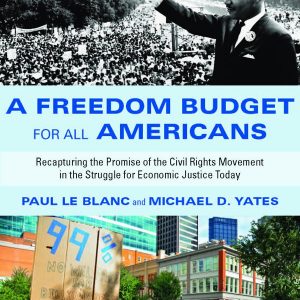‘A Freedom Budget for All’
August 21, 2013
By Scott McLemee
Three years after the March on Washington for Jobs and Freedom, a number of its core organizers projected a new stage of the struggle for equality — expanding and deepening it, creating the economic and social foundations needed to realize Martin Luther King’s dream. Their program, “A Freedom Budget for All Americans,” was issued by the A. Philip Randolph Institute in fall 1966. In his foreword, King called the document “a moral commitment to the fundamental principles on which this nation was founded.” Chances are you’ve never heard of it. (The original pamphlet is available in PDF here.)
Even in the much-abridged version reproduced in the appendix to Paul Le Blanc’s and Michael D. Yates’s A Freedom Budget for All Americans: Recapturing the Promise of the Civil Rights Movement in the Struggle for Economic Justice Today (Monthly Review, distributed by New York University Press), the proposal looks incredibly ambitious. It mapped out a course of structural reforms leading to full employment, universal access to adequate education and health care, and cleaner air and water. And the pace of change it projected was brisk. The plan could be in full effect by 1975, just in time for the bicentennial to open on a suitably confident and optimistic note.
The authors (Le Blanc is an associate professor at La Roche College in Pittsburgh, Yates an associate editor of Monthly Review) recount the genesis and logic of the Freedom Budget — as well as how it was derailed, with some of its advocates soon to find themselves on the opposite sides of various late 1960s barricades. With the 50th anniversary of the March on Washington looming, I interviewed Le Blanc by e-mail about the history and relevance of this mostly forgotten postscript to the event.
(About 20 years ago, Le Blanc and I collaborated in editing a volume of writings by C.L.R. James. Reviewing his latest book would be logrolling, but asking him questions about it counts as continuing my education.)
Q: Suppose you had the attention of everyone in the U.S for a couple of minutes to try to persuade as much of the public as possible that the Freedom Budget, so little remembered now, deserves another look. What’s would you say?
A: There is a detailed plan, worked out by prominent economists such as Leon Keyserling and others, endorsed by over 200 prominent academics, religious leaders, trade unionists, and civil rights figures, showing how we can end poverty and provide jobs for all — but it can only be implemented if we mobilize a powerful democratic struggle to make it so…

Comments are closed.